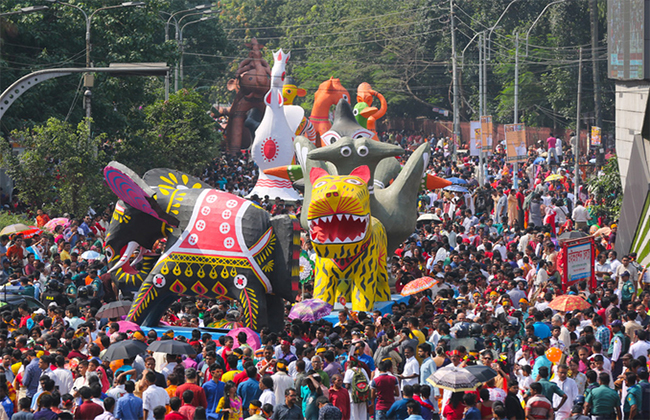
Culture is actually what we do. Our life is reflected in our culture. Various aspects of culture inspire people’s lives. The traditional culture of Bangladesh is much enriched. Folk culture speaks of the heart of our people, of the soil. Our folk culture speaks of the most beautiful aspect of life in simple and fluent language. The country has many other traditions, including Kabi Gaan, Pala Gaan, Jari Gaan, Murshidi Gaan, Nouka Baich (boat race), Ha-du-du, etc which make Bangladesh different from all others. At one time, these symbols of our culture used to keep rural Bangladesh intoxicated. As time went by, it seems that our folklore has become rusty. It has no pomp like it had before. Maybe, we have moved far away from our roots. It is very normal that the world will move at its own pace. Capitalism and modernisation will have an impact on our society. But it does not mean that we have to pull up our own roots.
The crisis in our culture is intensifying. Jari, Shari, Kabi Gaan, Kissa (oral story-telling) — we now have almost nothing of these. There were many types of songs sung in rural markets, fields and ghats. Jatra, circus were professionally organised. The Baul community used to enjoy free movements. The traditional look of Bangladesh does no longer exists now; not even the glorious days of Bengali films. Yet, many people were involved in various cultural activities in love with our culture. Whether regular or not, various cultural activities were used to be organised, once. These included music, recitations, stage plays, street plays, journeys, dance performances, concerts, etc. They have been closed for more than a year due to the pandemic. Those who were involved in these industries, especially artists and crews, are now in dire straits, financially. Many are leaving their jobs. It seems if the pandemic lasts longer, the cultural void in Bangladesh will become more apparent.
Like education, culture also plays a role in nation building. If there is a cultural vacuum, there develops a subculture, often brought in from abroad. As a result, humanity disappears. Immorality and crime increase among people. Militancy-terrorism becomes rampant. The current situation in Bangladesh gives us such an indication. The people of this country jumped into the war of liberation with a dream of building a prosperous country free from exploitation, communalism. Today, the country that became independent in exchange for the blood of three million martyrs has started moving to the opposite direction. One of the reasons is cultural hollowness. Those who are constantly struggling to bridge this void and trying to enrich the cultural milieu of the country in spite of hundreds of adversities deserves accolade. But the pandemic has become a huge obstacle in front of them. We have to move forward in the same way other countries are trying to preserve their culture. The crisis should not be allowed to escalate further.
Some cultural activities are being held virtually. It includes activities like discussion, music, recitation. But the cultural activities that require a lot of public participation and organization have been closed for long. These include stage plays, street plays, Jatras, dance performances, concerts, etc. As a result, both the organizers and the artists are in a great crisis. Many artists are joining other professions in need of livelihood. There are doubts whether they will return to this profession in the future.
Such a cultural vacuum is by no means desirable for the state. Our policymakers need to realise this and take necessary action. Shilpakala Academy needs to be more active in this regard. Now is the time to hold on to our heritage. As time goes by, the original culture is getting distorted. Let us not forget our identity in the course of time. Only a few steps of the cultured people of the country can save us. The government attention is also inevitable.


